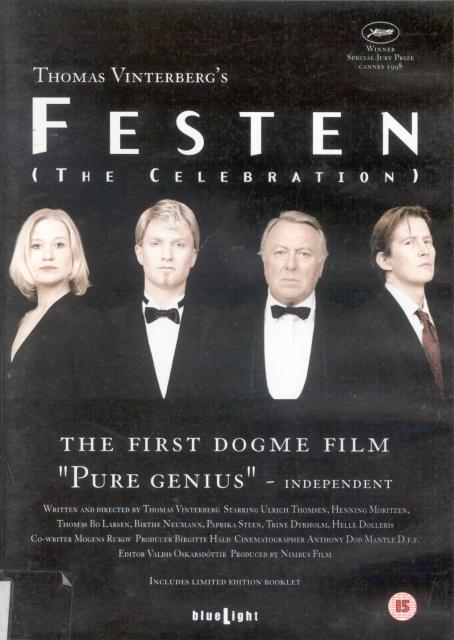
The Celebration is a Danish film, made by director Thomas Vinterberg, in 1998, which centres around the gathering of an upper class family for the 60th birthday celebrations of its patriarch, Helge Klingenfeldt-Hansen (Henning Moritzen) – soon after the mysterious death of his daughter, Linda. But what initially appears as a stuffy formal occasion begins to fragment, as dark family secrets come crawling out of the woodwork.
At the birthday dinner, Christian, the eldest son of Helge, publicly accuses his father of sexually abusing and raping both him and his twin sister, Linda. Although, the other family members do not believe the accusations at first, at the end of the film, Christian’s accusations are confirmed when the younger sister, Helene, reads Linda’s suicide note which states she had begun to have dreams in which her father had begun to molest her again, which led to her suicide.
This film is officially known in Denmark as Dogme # 1 Festen. Best known for being the first one of the Dogme 95 films, this film follows the Dogme 95 Manifesto quite diligently. Dogme 95 was a movement started by Danish directors Thomas Vinterberg and Lars von Trier in 1995. The movement started out at Le cinéma vers son deuxième siècle conference in Paris on March 22, 1995, where eminent personalities of world cinema had gathered to celebrate 100 years of cinema. Lars von Trier was called upon to speak about the future of film but instead showered a bemused audience with red pamphlets announcing the Dogme 95 movement.
The goal of the Dogme collective is to purify filmmaking by refusing expensive and spectacular special effects, postproduction modifications and other artificialities. The initial directors took a VOW OF CHASTITY (yes in capital letters only), and the 10-point manifesto went thus:
“I swear to submit to the following set of rules drawn up and confirmed by DOGMA 95:
1. Shooting must be done on location. Props and sets must not be brought in (if a particular prop is necessary for the story, a location must be chosen where this prop is to be found).
2. The sound must never be produced apart from the images or vice versa. (Music must not be used unless it occurs where the scene is being shot).
3. The camera must be hand-held. Any movement or immobility attainable in the hand is permitted. (The film must not take place where the camera is standing; shooting must take place where the film takes place).
4. The film must be in colour. Special lighting is not acceptable. (If there is too little light for exposure the scene must be cut or a single lamp be attached to the camera).
5. Optical work and filters are forbidden.
6. The film must not contain superficial action. (Murders, weapons, etc. must not occur.)
7. Temporal and geographical alienation are forbidden. (That is to say that the film takes place here and now.)
8. Genre movies are not acceptable.
9. The film format must be Academy 35 mm.
10. The director must not be credited.
Furthermore I swear as a director to refrain from personal taste! I am no longer an artist. I swear to refrain from creating a “work”, as I regard the instant as more important than the whole. My supreme goal is to force the truth out of my characters and settings. I swear to do so by all the means available and at the cost of any good taste and any aesthetic considerations.
Thus I make my VOW OF CHASTITY
Copenhagen, Monday 13 March 1995
On behalf of DOGMA 95, Lars von Trier, Thomas Vinterberg”
Coming back to the film in question, it is impossible to talk about certain films without delving into their method of production. The idea that modern film making had placed emphasis on technical audiovisual aspects rather than on actors and drama, which the movement was trying to change, enforcing everything from no special lighting to exclusive use of hand held cameras to allowing only sound recorded at the moment of filming, played the most significant role in the production of this film.
As a result, initially Festen lacks any charm: grainy DV, blown up to 35mm and shot in 4:3 ratio, gives a feeling somewhere between documentary and amateurish student videos. However, as the story unfolds, it is the drama and not the set, that takes centre stage – the DOGME 95 objective in practice.
For the layman, though, what is of more interest, is not the film’s story, but the movement behind the film.
For a character-driven story like that of Festen, it is important that the actors do justice to their character roles. And fortunately, the cast of Festen, involving, among others, Ulrich Thomsen as the traumatized son Christian and Thomas Bo Larsen as his increasingly unhinged brother Michael, manages to pull it off, quite strikingly. The drama of the film manages to be both unpredictable and absorbing, helped by the immediacy of the DOGME 95 style and some strong lead performances. This is realism taken to its extremes.
This sentiment was echoed when the film won the New York Film Critics Cirlcle Award (Best Foreign Language Film- 1998) as well as the Jury Prize at the Cannes Film Festival (1998), Los Angeles Film Critics Association Awards ( Best Foreign Language Film- 1998), among a host of others.
